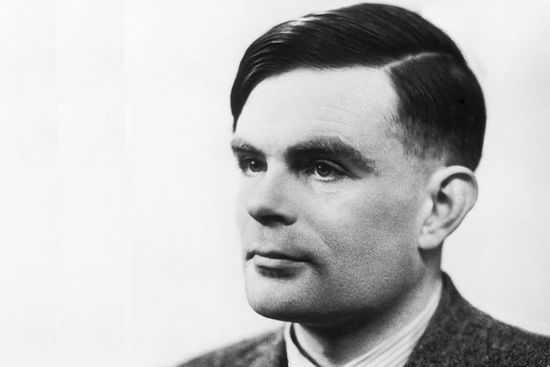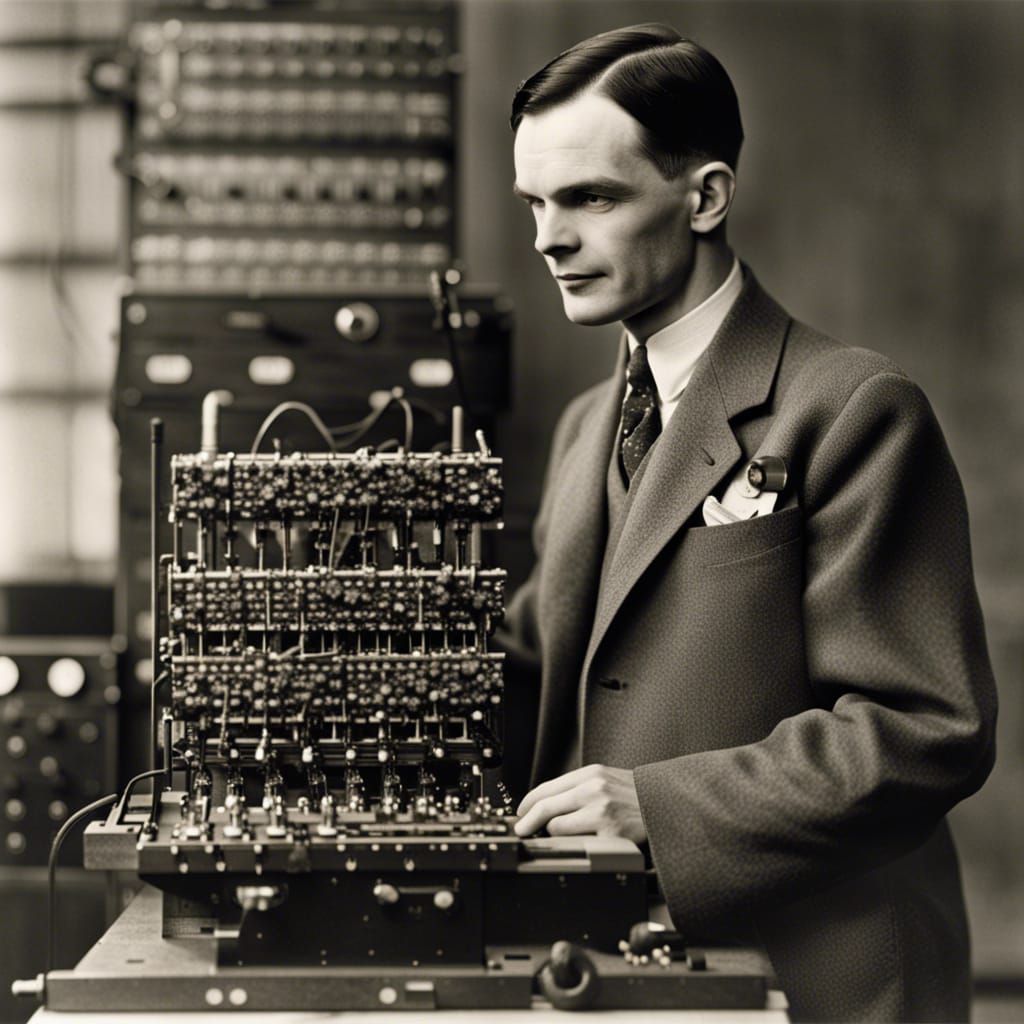Alan Turing: The Enigma of a Genius
Alan Turing stands as one of the most influential figures of the 20th century, whose work not only revolutionized the field of computer science but also played a pivotal role in the Allied victory during World War II. Beyond his contributions to mathematics and computing, Turing's life was marked by both brilliance and tragedy, leaving a profound legacy that continues to shape our world today. Born on June 23, 1912, in London, Alan Mathison Turing exhibited exceptional intellectual abilities from a young age. His early education at Sherborne School laid the foundation for his interest in mathematics, where he demonstrated a remarkable aptitude for solving complex problems. Turing's journey into the world of computation began during his undergraduate studies at King's College, University of Cambridge, where he immersed himself in the works of mathematicians such as Gödel and Church.
Born on June 23, 1912, in London, Alan Mathison Turing exhibited exceptional intellectual abilities from a young age. His early education at Sherborne School laid the foundation for his interest in mathematics, where he demonstrated a remarkable aptitude for solving complex problems. Turing's journey into the world of computation began during his undergraduate studies at King's College, University of Cambridge, where he immersed himself in the works of mathematicians such as Gödel and Church.
Turing's seminal paper, "On Computable Numbers, with an Application to the Entscheidungsproblem," published in 1936, introduced the concept of the Turing machine, a theoretical device capable of performing any algorithmic task. This groundbreaking idea laid the groundwork for modern computing and established Turing as a pioneer in the field. His theoretical framework provided a blueprint for understanding the limits and capabilities of computation, fundamentally shaping the development of digital computers in the decades to come. During World War II, Turing's genius was instrumental in breaking the German Enigma code, a feat that significantly shortened the war and saved countless lives. As part of Britain's top-secret code-breaking unit at Bletchley Park, Turing led efforts to decrypt encrypted German communications, developing the Bombe machine, which played a crucial role in deciphering Enigma-encoded messages. His work not only gave Allied forces a critical advantage but also laid the groundwork for modern cryptography and cybersecurity.
During World War II, Turing's genius was instrumental in breaking the German Enigma code, a feat that significantly shortened the war and saved countless lives. As part of Britain's top-secret code-breaking unit at Bletchley Park, Turing led efforts to decrypt encrypted German communications, developing the Bombe machine, which played a crucial role in deciphering Enigma-encoded messages. His work not only gave Allied forces a critical advantage but also laid the groundwork for modern cryptography and cybersecurity.
Despite his invaluable contributions to the war effort, Turing's personal life was marked by persecution and tragedy. As a gay man living in an era when homosexuality was illegal in the United Kingdom, Turing faced discrimination and prejudice. In 1952, he was convicted of "gross indecency" for his relationship with another man and subjected to chemical castration as an alternative to imprisonment. The treatment took a severe toll on Turing's mental and physical health, ultimately leading to his tragic death by cyanide poisoning in 1954, ruled as suicide. Turing's untimely death robbed the world of one of its brightest minds, but his legacy endured and grew in the years following his passing. In 2009, the British government issued an official apology for the appalling treatment Turing endured, acknowledging his significant contributions to the nation. Subsequently, in 2013, Turing received a posthumous royal pardon, recognizing the injustice he faced.
Turing's untimely death robbed the world of one of its brightest minds, but his legacy endured and grew in the years following his passing. In 2009, the British government issued an official apology for the appalling treatment Turing endured, acknowledging his significant contributions to the nation. Subsequently, in 2013, Turing received a posthumous royal pardon, recognizing the injustice he faced.
Beyond his contributions to science and technology, Turing's legacy extends to questions of artificial intelligence and the nature of consciousness. His famous Turing Test, proposed in his 1950 paper "Computing Machinery and Intelligence," laid the foundation for evaluating machine intelligence by assessing its ability to exhibit human-like behavior in conversation. This test sparked decades of debate and research into the nature of AI, influencing the development of intelligent systems and robotics.
Turing's impact on the world continues to resonate in various fields, from mathematics and computing to philosophy and ethics. His pioneering work in cryptography laid the groundwork for modern cybersecurity, ensuring the privacy and security of digital communications. Moreover, his visionary ideas about artificial intelligence continue to inspire researchers and technologists in their quest to understand and replicate human intelligence. In recognition of his enduring legacy, numerous honors and tributes have been bestowed upon Turing posthumously. In addition to the royal pardon and official apologies, he has been commemorated through statues, monuments, and academic awards worldwide. The Turing Award, often referred to as the "Nobel Prize of Computing," is named in his honor and recognizes individuals who have made significant contributions to the field of computer science.
In recognition of his enduring legacy, numerous honors and tributes have been bestowed upon Turing posthumously. In addition to the royal pardon and official apologies, he has been commemorated through statues, monuments, and academic awards worldwide. The Turing Award, often referred to as the "Nobel Prize of Computing," is named in his honor and recognizes individuals who have made significant contributions to the field of computer science.
Alan Turing's life and work encapsulate the complexity of human genius and the enduring quest for knowledge and understanding. Despite facing immense challenges and adversity, Turing's brilliance shone through, leaving an indelible mark on the world that continues to inspire and influence generations to come. As we reflect on his remarkable achievements, we are reminded of the power of intellect and the importance of upholding justice and equality for all. Alan Turing's legacy serves as a beacon of hope and inspiration, guiding us toward a future shaped by compassion, curiosity, and innovation.
Beyond his contributions to science and technology, Alan Turing's legacy extends into the realm of philosophy and ethics. His work raised profound questions about the nature of consciousness, intelligence, and the ethical implications of technological advancement. Turing's exploration of artificial intelligence, particularly his Turing Test, sparked debates about the possibility of machines possessing human-like intelligence and the ethical considerations surrounding the creation of sentient beings./https://tf-cmsv2-smithsonianmag-media.s3.amazonaws.com/filer_public/4e/92/4e923560-ce0a-42c5-8952-3967867c810a/turing_31.jpg) The Turing Test, proposed in his seminal paper "Computing Machinery and Intelligence," presented a pragmatic approach to assessing machine intelligence. Turing suggested that if a computer could engage in natural language conversation indistinguishable from that of a human, then it could be considered intelligent. This simple yet profound idea sparked decades of research into natural language processing and machine learning, leading to significant advancements in the field of artificial intelligence.
The Turing Test, proposed in his seminal paper "Computing Machinery and Intelligence," presented a pragmatic approach to assessing machine intelligence. Turing suggested that if a computer could engage in natural language conversation indistinguishable from that of a human, then it could be considered intelligent. This simple yet profound idea sparked decades of research into natural language processing and machine learning, leading to significant advancements in the field of artificial intelligence.
However, Turing's work also raised ethical concerns about the implications of creating intelligent machines. He contemplated whether machines could ever truly exhibit consciousness and whether they should be treated as sentient beings with rights and moral considerations. These questions remain at the forefront of debates surrounding AI ethics and the responsible development of intelligent systems.
Furthermore, Turing's personal struggles underscored broader societal issues related to discrimination and the marginalization of minority groups. His persecution for his sexual orientation serves as a poignant reminder of the injustices faced by LGBTQ+ individuals throughout history. Turing's tragic death tragically highlights the devastating consequences of bigotry and intolerance. In recent years, there has been a renewed focus on honoring Turing's legacy and rectifying the injustices he endured. Initiatives aimed at celebrating his achievements and promoting inclusivity in STEM fields have gained traction, highlighting the importance of diversity and acceptance in fostering innovation and progress.
In recent years, there has been a renewed focus on honoring Turing's legacy and rectifying the injustices he endured. Initiatives aimed at celebrating his achievements and promoting inclusivity in STEM fields have gained traction, highlighting the importance of diversity and acceptance in fostering innovation and progress.
Moreover, Turing's life story serves as a cautionary tale about the dangers of discrimination and the need for societal acceptance and tolerance. His brilliance and contributions to humanity were nearly overshadowed by the prejudice of his time, highlighting the importance of creating a more equitable and compassionate world.
As we commemorate the life and work of Alan Turing, we are reminded of the power of resilience, perseverance, and intellectual curiosity. His legacy continues to inspire generations of scientists, thinkers, and activists to push the boundaries of knowledge and strive for a more just and compassionate society. Alan Turing's enduring impact serves as a testament to the indomitable human spirit and the transformative power of ideas.
































